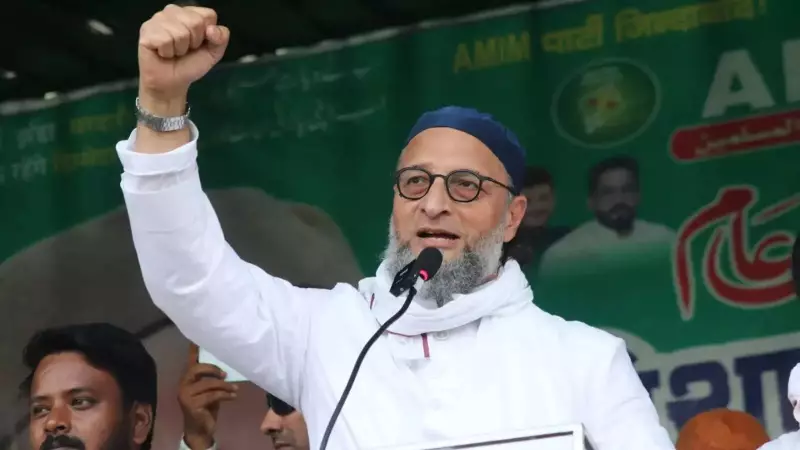
In a candid conversation with Times of India, All India Majlis-e-Ittehadul Muslimeen (AIMIM) president Asaduddin Owaisi has mounted a vigorous defense of his party's political strategy in Bihar while forcefully rejecting the persistent allegation that his party acts as the BJP's "B-team."
Expanding Beyond Seemanchal
The Hyderabad MP revealed that contrary to popular perception, his party is not limiting its political activities to the Seemanchal region alone. Of the 27 seats where AIMIM candidates are contesting in Bihar, eight to nine constituencies are located outside the Seemanchal area, including Sherghati in the Magadh region.
"This time, it is not only Seemanchal. We are contesting in other areas too," Owaisi stated, indicating his party's expanding footprint in Bihar politics beyond its traditional stronghold.
Why Seemanchal Remains Special
Owaisi explained the emotional and political connection his party shares with Seemanchal, where AIMIM began its Bihar political journey in 2015 from Kishanganj. However, his affection for the region is matched by his outrage at its developmental neglect.
"All major developments are concentrated in Patna – be it IIT, AIIMS or Rajgir," he pointed out, highlighting the regional disparity in development allocation. Both Hindu and Muslim residents of Seemanchal continue to work as bonded laborers, with Owaisi claiming he has photographic evidence of buses full of bonded workers from Baisi who are permitted to return home only during festivals.
The AIMIM leader cited alarming statistics about the region: Seemanchal has the highest migration rate in Bihar, suffers from severe child malnutrition, and records the lowest literacy levels in the state. He also referenced a Bachpan Bachao Andolan report in the Supreme Court about organs of small children being stolen in this neglected region.
Countering the BJP's B-Team Allegation
Addressing the frequent accusation that AIMIM helps the BJP by dividing Muslim votes, Owaisi delivered a sharp rebuttal. "This is a very common allegation. But none of the parties that make this charge dare to say the same about Hindu castes that vote against them," he observed.
He questioned the logic behind blaming Muslim voting patterns for political failures, noting that Narendra Modi has become Prime Minister three times regardless of how Muslims voted. "Those who project themselves as saviours of Muslims actually treat Muslims only as voters, nothing more," he accused.
Owaisi emphasized the constitutional principle of equality, arguing that India's politics should be guided by substantive equality rather than tokenism or formal equality that doesn't translate into real empowerment.
Failed Grand Alliance Negotiations
The AIMIM chief revealed details about his party's attempt to join the Grand Alliance, countering claims that they never seriously sought inclusion. AIMIM state president Akhtarul Iman wrote to all Grand Alliance partners, including RJD and Congress, except VIP which wasn't part of the alliance at that time.
"He clearly stated that we wanted only six seats and no ministerial post," Owaisi disclosed. The party also demanded a special package for Seemanchal under Article 371 of the Constitution, but received no positive response from alliance leaders.
Owaisi questioned the sincerity of parties that label AIMIM as BJP's B-team while themselves engaging in what he characterized as anti-minority actions. He cited specific examples: in Narkatiaganj, the alliance nominated Deepak Yadav, who was associated with Vishwa Hindu Parishad and whose photos distributing swords went viral. In Gobindpur, Nawada, they denied a ticket to Mohammad Kamran, who had previously won with nearly 33,000 votes, choosing instead newcomer Purnia Yadav.
The AIMIM leader highlighted representation disparities: Yadavs form about 14% of Bihar's population but received 36% of tickets, while Muslims constituting 17% of the population got only token representation. He noted that from 1960 to 2020, just 17% of Muslim MLAs have been elected in Bihar.
Addressing MLA Defections
When questioned about four of his five MLAs from the previous assembly election joining RJD in 2022, Owaisi responded with biting sarcasm. "Look at their condition now. Three of them have not even been given tickets this time. They were used and thrown away."
He challenged the INDIA bloc's consistency, asking why they protest the murder of democracy in Maharashtra, Madhya Pradesh, and Karnataka but remain silent when similar actions occur in Bihar by one of their own partners.
Impact of Special Intensive Revision
On the question of whether the Special Intensive Revision (SIR) of electoral rolls would impact the assembly elections, Owaisi offered a terse response: "Just wait for the results – it will be clear."
He mocked the NDA's persistent talk about "ghuspathiyas" (infiltrators), challenging anyone to name even a hundred such individuals, thus questioning the very premise of the infiltration narrative that has dominated political discourse.
Through this comprehensive interview, Owaisi has positioned AIMIM as a party demanding substantive equality and development rather than engaging in token politics, while firmly establishing his party's independent political identity separate from both the BJP and traditional opposition parties.





